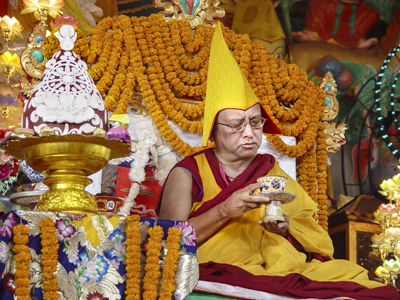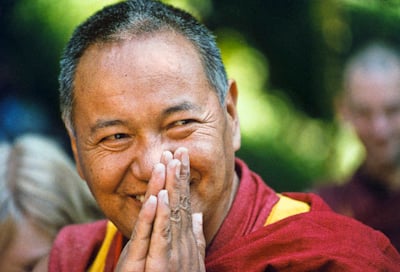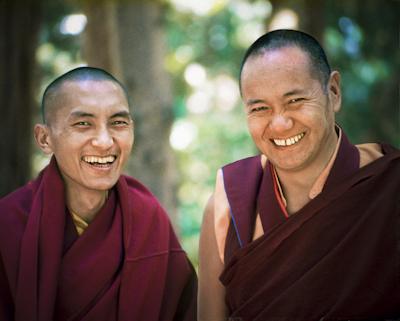Dear LYWA friends and supporters,
Thank you so much for your kind interest in and support of the Archive.
Supporting the Archive, A Resource of Compassion and Wisdom For All
As you know, we are in the throes of our year-end fund raising campaign, trying to reach our goal of $50,000 by the end of December. So far we have raised $25,000 and I really want to thank most sincerely all those who have contributed up to this point. We're halfway there! Still, we have $25,000 to go and I urge you to make a donation right now to ensure that we have the funds we need to keep bringing you and all beings the Dharma teachings that we do, in print and on line.
Our recent books, Freedom Through Understanding and Teachings from the Medicine Buddha Retreat have been very well received and we are very grateful for the positive feedback. Three more books are well on the way, for publication early next year. It is a very exciting time for us and we look forward to being able to send you many amazing teachings over the next twelve months. But it is only through your generous support that we can do so, so please help out as best you can. Thank you so much.
Long Life Puja for Lama Zopa Rinpoche  The annual long life puja offered on behalf of the centers, study groups, projects, services and students of the FPMT to our most kind and immeasurably precious Spiritual Director, Lama Zopa Rinpoche, source of our inspiration and guidance, will be offered at Kopan Monastery after the usual November course, around the middle of December.
The annual long life puja offered on behalf of the centers, study groups, projects, services and students of the FPMT to our most kind and immeasurably precious Spiritual Director, Lama Zopa Rinpoche, source of our inspiration and guidance, will be offered at Kopan Monastery after the usual November course, around the middle of December.
Offering the long life puja creates the cause for the lama to have a long and stable life, and to continue his compassionate activities, which benefit all sentient beings. The special Dharma relationship between a student and a teacher makes the prayers that we offer for Rinpoche's long life even more powerful. And as Rinpoche always says, it's our long life puja as well—the merits accumulated add to our health and longevity to enable us to practice and serve others. Moreover, as it strengthens our connection with the precious spiritual friend, it creates the cause for us to meet with such holy beings in future lives until we attain the highest goal of enlightenment.
If you would like to contribute to this very special puja, please go here. If you would like your name to be included in the list of donors, your offering has to reach FPMT by Monday, December 7.
New Online Developments
The Archive now has a page on Facebook. Follow our FB page to see regular posts with links to our newest web additions. You can also subscribe to our RSS feed, and follow us on Twitter.
Listen online to the teachings which form the basis of our new book Teachings From the Medicine Buddha Retreat. We've posted the audio and unedited transcripts from three chapters of the book.
As usual there are a number of additions to Rinpoche's Online Advice Book. In the Practice Advice section there are updates to the topics Advice for New Students, Daily Practices, and General Practice Advice. In the Miscellaneous section you can read advice on Dharma and Worldly Activities. There are now over 850 advices posted!
Final Words
We recently received a copy of the newly-published Indonesian translation of Teachings From Tibet. Many of our books have been translated into other languages; see a listing here.
Thank you again. We really do appreciate your wonderful support. And we are delighted to leave you with a short teaching on emptiness by Lama Yeshe.
Much love,
Nick Ribush
Director
Understanding Emptiness What is the self-existent I? The self-existent I does not exist; do not think that it does. In this way, we first try to educate you with words: "There is no dualistic I." We try to push you. "There’s no self-existent I." We try to push you intellectually. But at the time of death, this understanding is not pushed intellectually; it comes naturally. You lose your self-existent identity naturally.
What is the self-existent I? The self-existent I does not exist; do not think that it does. In this way, we first try to educate you with words: "There is no dualistic I." We try to push you. "There’s no self-existent I." We try to push you intellectually. But at the time of death, this understanding is not pushed intellectually; it comes naturally. You lose your self-existent identity naturally.
Some people experience losing their identity in meditation and get scared. That's good. You should be scared. Tibetan monks want to make you afraid. Westerners don't like to be scared but we have the skills to make you afraid! Many people have this experience. That's good.
Why are you afraid? Why are you afraid to lose something? What you're losing is your self-existent or concrete preconception of yourself. That's what's shaken. Your own projection of yourself is what shakes; it's not your own nonduality that's shaken. Your own true nature isn't shaken.
Once Lama Je Tsongkhapa was giving a discourse on emptiness. During the talk one of his close disciples experienced emptiness right at that moment and suddenly grabbed his lapel because he felt he was disappearing. He completely lost himself and was totally shaken by the experience, so grabbed himself to make sure he was still there. That's how it should be: experiences and realizations should come during a teaching. So, the way to discover your own true nature is to break the fantasy, or preconceived ideas, of yourself.
Perhaps there can be misunderstandings because the English language may have many different ways of interpreting the words "self" and "losing the self." I'm using the word preconception. That means you fix your reality: "I am this, I am that, I am the other. This is me." You create a strong preconceived idea of who you are, what you are. That's what I mean by "self." That self is non-existent. It's merely a projection of your own ego.
For example, a man identifies himself as such and such a woman's husband. In this way he gives himself the flavor of a self-existent husband. When he's decided that he's this concrete, self-existent husband, he immediately projects onto his wife that she too is a concrete, self-existent wife. These concrete preconceptions lead to misery. "My existence depends on my wife. If she disappears, so do I." He identifies himself as a concrete husband and her as a concrete wife, and then his life becomes impossible. Because the truth of the situation is that both he and his wife are impermanent, transitory, changing from day to day. In other words, he overestimates reality.
These days we see a lot of confusion among young people. "Society wants me to be someone: an engineer, a scientist." They feel they need a profession with which they can identify themselves. Part of them believes it; another part does not. So they're confused. Nevertheless, they do want some kind of identity so they create their own. They drop out, take drugs and become hippies. That doesn't mean they don't have ego. They already have an ego but they want another layer on it with which they can identify. They already have a self-existent I; they want to add an extra flavor to that.
It's quite easy to experience the self-existent imagination of yourself I'm talking about. It's not difficult. Right now you can observe and analyze your self-imagined identity. And because you have preconceptions about this self you get into trouble. You always criticize yourself: "I'm not good enough." If you analyze this way of thinking you will understand how you're deluded and not in touch with reality. You can understand right now.
Because you hold such a limited projection of yourself, such a limited self-image, this becomes the root of all your other limitations. You have limited love, limited wisdom and limited compassion. You've already decided that fundamentally, you're narrow. So your whole life becomes narrow, your wisdom becomes narrow, your love becomes narrow—all because of your fundamentally narrow projection of yourself.
Lama Yeshe gave this teaching in Geneva, Switzerland, in September 1983, his last teaching in the West. Edited from the Lama Yeshe Wisdom Archive by Nicholas Ribush.
































